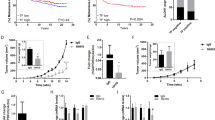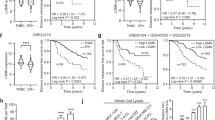Abstract
Triggering of Toll-like receptor 4 (TLR4) on tumor cells has been found to promote tumor progression by promoting tumor cell proliferation and survival. So far, however, the effect of TLR4 signaling on tumor metastasis has not been well elucidated. Here, we report that triggering of TLR4 on metastatic breast cancer cells could reciprocally regulate the expression of αvβ3 and the expressions of TPM1 and maspin, and promote αvβ3-mediated adhesion and invasive migration of the cells. In metastatic breast cancer cells, TLR4 signaling increased the expression of integrin αvβ3 by activating NF-κB, resulting in the increased adhesion capacity of tumor cells to the ligand for αvβ3, and the increased polymerization of actin and production of MMP-9 in tumor cells in response to ECM. HoxD3 was required for the up-regulation of αv and β3 expressions by NF-κB. Moreover, TLR4 signaling increased the expression of miR-21 in breast cancer cells by activating NF-κB. Accordingly, the expressions of TPM1 and maspin were decreased at protein level, whereas the transcription activity of these genes was not influenced. Consistent with the promoting effect on αvβ3-mediated adhesion and invasive migration, TLR4 signaling promoted the arrest of metastatic breast cancer cells in circulation and following invasion. The effect of TLR4 signaling could be abrogated by inhibiting NF-κB. These findings suggest that metastatic breast cancer cells could acquire higher metastatic potential due to triggering of TLR4 and activation of NF-κB in the cells, and that both TLR4 and NF-κB could be therapeutic targets for preventing metastasis of breast cancer cells.






Similar content being viewed by others
References
Chambers AF, Groom AC, MacDonald IC (2002) Dissemination and growth of cancer cells in metastatic sites. Nat Rev Cancer 2:563–572
Felding-Habermann B, O’Toole TE, Smith JW, Fransvea E, Ruggeri ZM, Ginsberg MH, Hughes PE, Pampori N, Shattil SJ, Saven A, Mueller BM (2001) Integrin activation controls metastasis in human breast cancer. Proc Natl Acad Sci USA 98:1853–1858
Han HJ, Russo J, Kohwi Y, Kohwi-Shigematsu T (2008) SATB1 reprogrammes gene expression to promote breast tumour growth and metastasis. Nature 452:187–193
Zhu S, Wu H, Wu F, Nie D, Sheng S, Mo YY (2008) MicroRNA-21 targets tumor suppressor genes in invasion and metastasis. Cell Res 18:350–359
Beauvais DM, Burbach BJ, Rapraeger AC (2004) The syndecan-1 ectodomain regulates alphavbeta3 integrin activity in human mammary carcinoma cells. J Cell Biol 167:171–181
Ma L, Teruya-Feldstein J, Weinberg RA (2007) Tumour invasion and metastasis initiated by microRNA-10b in breast cancer. Nature 449:682–688
Zheng X, Jiang F, Katakowski M, Zhang ZG, Lu QE, Chopp M (2009) ADAM17 promotes breast cancer cell malignant phenotype through EGFR-PI3K-AKT activation. Cancer Biol Ther 8:1045–1054
Tsan MF, Gao B (2004) Endogenous ligands of Toll-like receptors. J Leukoc Biol 76:514–519
Szczepanski MJ, Czystowska M, Szajnik M, Harasymczuk M, Boyiadzis M, Kruk-Zagajewska A, Szyfter W, Zeromski J, Whiteside TL (2009) Triggering of Toll-like receptor 4 expressed on human head and neck squamous cell carcinoma promotes tumor development and protects the tumor from immune attack. Cancer Res 69:3105–3113
Huang B, Zhao J, Li H, He KL, Chen Y, Chen SH, Mayer L, Unkeless JC, Xiong H (2005) Toll-like receptors on tumor cells facilitate evasion of immune surveillance. Cancer Res 65:5009–5014
Wang EL, Qian ZR, Nakasono M, Tanahashi T, Yoshimoto K, Bando Y, Kudo E, Shimada M, Sano T (2010) High expression of Toll-like receptor 4/myeloid differentiation factor 88 signals correlates with poor prognosis in colorectal cancer. Br J Cancer 102:908–915
Hua D, Liu MY, Cheng ZD, Qin XJ, Zhang HM, Chen Y, Qin GJ, Liang G, Li JN, Han XF, Liu DX (2009) Small interfering RNA-directed targeting of Toll-like receptor 4 inhibits human prostate cancer cell invasion, survival, and tumorigenicity. Mol Immunol 46:2876–2884
Earl TM, Nicoud IB, Pierce JM, Wright JP, Majoras NE, Rubin JE, Pierre KP, Gorden DL, Chari RS (2009) Silencing of TLR4 decreases liver tumor burden in a murine model of colorectal metastasis and hepatic steatosis. Ann Surg Oncol 16:1043–1050
Szajnik M, Szczepanski MJ, Czystowska M, Elishaev E, Mandapathil M, Nowak-Markwitz E, Spaczynski M, Whiteside TL (2009) TLR4 signaling induced by lipopolysaccharide or paclitaxel regulates tumor survival and chemoresistance in ovarian cancer. Oncogene 28:4353–4363
Arrighi JF, Rebsamen M, Rousset F, Kindler V, Hauser C (2001) A critical role for p38 mitogen-activated protein kinase in the maturation of human blood-derived dendritic cells induced by lipopolysaccharide, TNF-alpha, and contact sensitizers. J Immunol 166:3837–3845
Hood JD, Cheresh DA (2002) Role of integrins in cell invasion and migration. Nat Rev Cancer 2:91–100
Gong W, Liu Y, Huang B, Lei Z, Wu FH, Li D, Feng ZH, Zhang GM (2008) Recombinant CBD-HepII polypeptide of fibronectin inhibits alphavbeta3 signaling and hematogenous metastasis of tumor. Biochem Biophys Res Commun 367:144–149
Gong W, Zhang GM, Liu Y, Lei Z, Li D, Yuan Y, Huang B, Feng ZH (2008) IFN-gamma withdrawal after immunotherapy potentiates B16 melanoma invasion and metastasis by intensifying tumor integrin alphavbeta3 signaling. Int J Cancer 123:702–708
Rolli M, Fransvea E, Pilch J, Saven A, Felding-Habermann B (2003) Activated integrin alphavbeta3 cooperates with metalloproteinase MMP-9 in regulating migration of metastatic breast cancer cells. Proc Natl Acad Sci USA 100:9482–9487
Vellon L, Menendez JA, Lupu R (2005) αvβ3 integrin regulates heregulin (HRG)-induced cell proliferation and survival in breast cancer. Oncogene 24:3759–3773
Karmakar S, Dhar R, Das C (2004) Inhibition of cytotrophoblastic (JEG-3) cell invasion by interleukin 12 involves an interferon gamma-mediated pathway. J Biol Chem 279:55297–55307
Popow A, Nowak D, Malicka-Błaszkiewicz M (2006) Actin cytoskeleton and beta-actin expression in correlation with higher invasiveness of selected hepatoma Morris 5123 cells. J Physiol Pharmacol 57(Suppl 7):111–123
Nowak D, Krawczenko A, Duś D, Malicka-Błaszkiewicz M (2002) Actin in human colon adenocarcinoma cells with different metastatic potential. Acta Biochim Pol 49:823–828
Lai TH, Fong YC, Fu WM, Yang RS, Tang CH (2009) Stromal cell-derived factor-1 increase alphavbeta3 integrin expression and invasion in human chondrosarcoma cells. J Cell Physiol 218:334–342
Ohta H, Hamada J, Tada M, Aoyama T, Furuuchi K, Takahashi Y, Totsuka Y, Moriuchi T (2006) HoxD3-overexpression increases integrin αvβ3 expression and deprives E-cadherin while it enhances cell motility in A549 cells. Clin Exp Metastasis 23:381–390
Ruseva Z, Geiger PX, Hutzler P, Kotzsch M, Luber B, Schmitt M, Gross E, Reuning U (2009) Tumor suppressor KAI1 affects integrin alphavbeta3-mediated ovarian cancer cell adhesion, motility, and proliferation. Exp Cell Res 315:1759–1771
Jee BK, Park KM, Surendran S, Lee WK, Han CW, Kim YS, Lim Y (2006) KAI1/CD82 suppresses tumor invasion by MMP9 inactivation via TIMP1 up-regulation in the H1299 human lung carcinoma cell line. Biochem Biophys Res Commun 342:655–661
Zheng Q, Safina A, Bakin AV (2008) Role of high-molecular weight tropomyosins in TGF-beta-mediated control of cell motility. Int J Cancer 122:78–90
Khalkhali-Ellis Z, Hendrix MJ (2007) Elucidating the function of secreted maspin: inhibiting cathepsin D-mediated matrix degradation. Cancer Res 67:3535–3539
Pilch J, Habermann R, Felding-Habermann B (2002) Unique ability of integrin alpha(v)beta 3 to support tumor cell arrest under dynamic flow conditions. J Biol Chem 277:21930–21938
Felding-Habermann B (2003) Integrin adhesion receptors in tumor metastasis. Clin Exp Metastasis 20:203–213
Tsai YC, Mendoza A, Mariano JM, Zhou M, Kostova Z, Chen B, Veenstra T, Hewitt SM, Helman LJ, Khanna C, Weissman AM (2007) The ubiquitin ligase gp78 promotes sarcoma metastasis by targeting KAI1 for degradation. Nat Med 13:1504–1509
Yang X, Welch DR, Phillips KK, Weissman BE, Wei LL (1997) KAI1, a putative marker for metastatic potential in human breast cancer. Cancer Lett 119:149–155
Kojic LD, Joshi B, Lajoie P, Le PU, Cox ME, Turbin DA, Wiseman SM, Nabi IR (2007) Raft-dependent endocytosis of autocrine motility factor is phosphatidylinositol 3-kinase-dependent in breast carcinoma cells. J Biol Chem 282:29305–29313
Varga AE, Stourman NV, Zheng Q, Safina AF, Quan L, Li X, Sossey-Alaoui K, Bakin AV (2005) Silencing of the Tropomyosin-1 gene by DNA methylation alters tumor suppressor function of TGF-beta. Oncogene 24:4052–5043
Futscher BW, O’Meara MM, Kim CJ, Rennels MA, Lu D, Gruman LM, Seftor RE, Hendrix MJ, Domann FE (2004) Aberrant methylation of the maspin promoter is an early event in human breast cancer. Neoplasia 6:380–389
Zhu S, Si ML, Wu H, Mo YY (2007) MicroRNA-21 targets the tumor suppressor gene tropomyosin 1 (TPM1). J Biol Chem 282:14328–14336
Karin M, Cao Y, Greten FR, Li ZW (2002) NF-kappaB in cancer: from innocent bystander to major culprit. Nat Rev Cancer 2:301–310
Lee CH, Jeon YT, Kim SH, Song YS (2007) NF-kappaB as a potential molecular target for cancer therapy. Biofactors 29:19–35
Youn HS, Lee JY, Fitzgerald KA, Young HA, Akira S, Hwang DH (2005) Specific inhibition of MyD88-independent signaling pathways of TLR3 and TLR4 by resveratrol: molecular targets are TBK1 and RIP1 in TRIF complex. J Immunol 175:3339–3346
Okubo Y, Hamada J, Takahashi Y, Tada M, Tsutsumida A, Furuuchi K, Aoyama T, Sugihara T, Moriuchi T (2002) Transduction of HoxD3-antisense into human melanoma cells results in decreased invasive and motile activities. Clin Exp Metastasis 19:503–511
Li F, Sethi G (2010) Targeting transcription factor NF-kappaB to overcome chemoresistance and radioresistance in cancer therapy. Biochim Biophys Acta 1805:167–180
Baldwin AS (2001) Control of oncogenesis and cancer therapy resistance by the transcription factor NF-kappaB. J Clin Invest 107:241–246
Acknowledgments
This study was supported by National Science Foundation of China (No. 30830095, 30771974, 30772589), and National Development Program (973) For Key Basic Research (No. 2009CB521806) of China.
Conflict of interest
The authors declare no conflict of interest.
Author information
Authors and Affiliations
Corresponding author
Rights and permissions
About this article
Cite this article
Liao, SJ., Zhou, YH., Yuan, Y. et al. Triggering of Toll-like receptor 4 on metastatic breast cancer cells promotes αvβ3-mediated adhesion and invasive migration. Breast Cancer Res Treat 133, 853–863 (2012). https://doi.org/10.1007/s10549-011-1844-0
Received:
Accepted:
Published:
Issue Date:
DOI: https://doi.org/10.1007/s10549-011-1844-0




